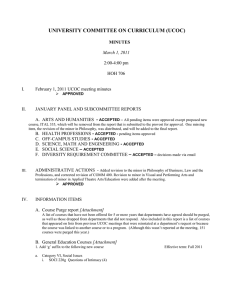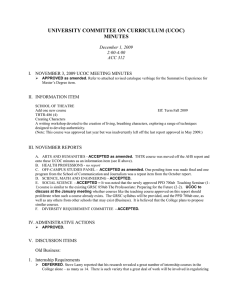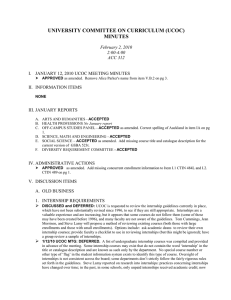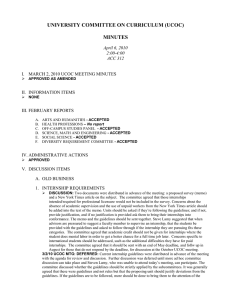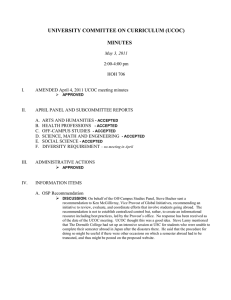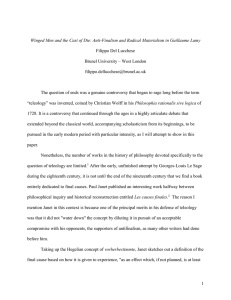UNIVERSITY COMMITTEE ON CURRICULUM (UCOC)
advertisement
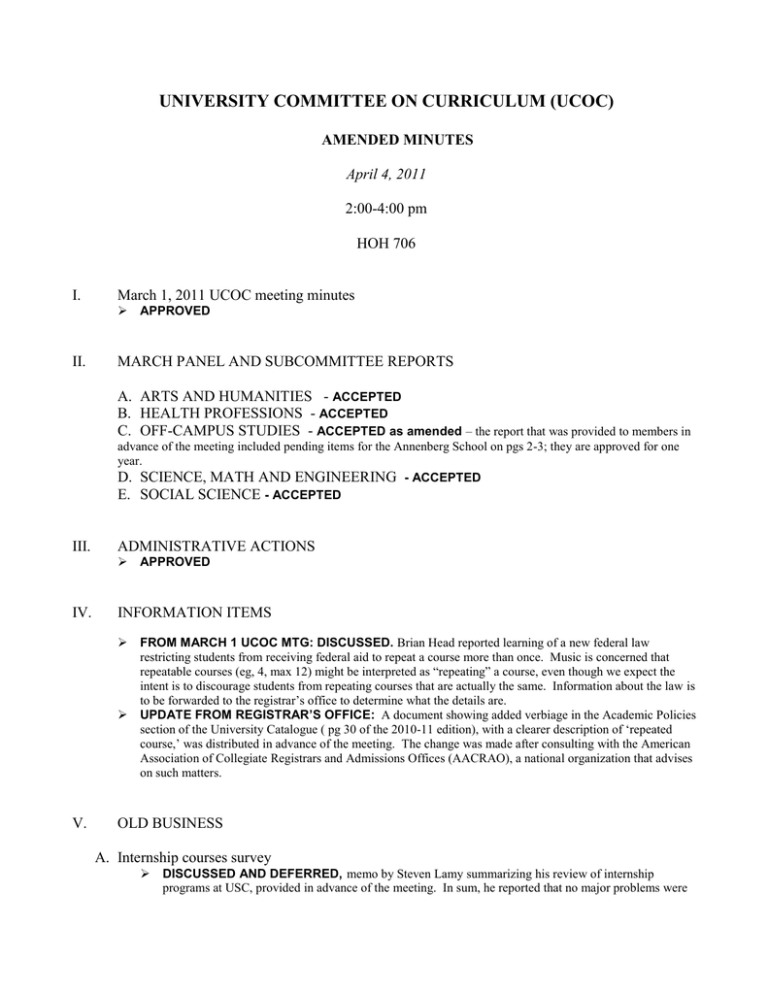
UNIVERSITY COMMITTEE ON CURRICULUM (UCOC) AMENDED MINUTES April 4, 2011 2:00-4:00 pm HOH 706 I. March 1, 2011 UCOC meeting minutes II. APPROVED MARCH PANEL AND SUBCOMMITTEE REPORTS A. ARTS AND HUMANITIES - ACCEPTED B. HEALTH PROFESSIONS - ACCEPTED C. OFF-CAMPUS STUDIES - ACCEPTED as amended – the report that was provided to members in advance of the meeting included pending items for the Annenberg School on pgs 2-3; they are approved for one year. D. SCIENCE, MATH AND ENGINEERING - ACCEPTED E. SOCIAL SCIENCE - ACCEPTED III. ADMINISTRATIVE ACTIONS IV. INFORMATION ITEMS V. APPROVED FROM MARCH 1 UCOC MTG: DISCUSSED. Brian Head reported learning of a new federal law restricting students from receiving federal aid to repeat a course more than once. Music is concerned that repeatable courses (eg, 4, max 12) might be interpreted as “repeating” a course, even though we expect the intent is to discourage students from repeating courses that are actually the same. Information about the law is to be forwarded to the registrar’s office to determine what the details are. UPDATE FROM REGISTRAR’S OFFICE: A document showing added verbiage in the Academic Policies section of the University Catalogue ( pg 30 of the 2010-11 edition), with a clearer description of ‘repeated course,’ was distributed in advance of the meeting. The change was made after consulting with the American Association of Collegiate Registrars and Admissions Offices (AACRAO), a national organization that advises on such matters. OLD BUSINESS A. Internship courses survey DISCUSSED AND DEFERRED, memo by Steven Lamy summarizing his review of internship programs at USC, provided in advance of the meeting. In sum, he reported that no major problems were UCOC Minutes April 5, 2011 Page 2 of 5 found in the implementation of internships at USC. The professional schools monitor the process carefully and provide the greatest support both in matching students with internships and monitoring the experience during the term. Problems that surfaced during the information-gathering phase of the internship survey (such as staff members providing grades for one program) are being addressed. A welltimed recent New York Times article indicated that evidence shows that students doing internships are being exploited. The article included a recommendation that programs should not require internships, and that paying for internships (in the form of tuition for a course) should be avoided. The UCOC’s response is the benefits outweigh the problems, especially if it’s 1-unit course and the course integrates the internship into the program, and includes a structured faculty mentor experience. UCOC suggested that the general observations be developed into a ‘top ten’ list for inclusion in the curriculum handbook, specifically as an addendum to the internship guidelines already there; Steve Lamy agreed to draft it. FROM THE MINUTES OF THE 3/1/11 UCOC MEETING: NO NEW INFORMATION TO REPORT. FROM THE MINUTES OF THE 2/1/11 UCOC MEETING: DEFERRED: Work continues on the report. FROM THE MINUTES OF THE 1/11/11 UCOC MEETING: DISCUSSED AND DEFERRED: Report by Steve Lamy report is in development. He reported that overall, most departments follow the guidelines; professional schools follow them more closely than non-professional schools. Findings include that some internships are paid and some are not; some schools leave it up to the student to find the internships and others excel in matching students with opportunities, and fewer departments have staff members assign grades than initially assumed/reported. A best-practices template will be developed and should be posted along with the internship guidelines in the Curriculum handbook. Recommendations are expected to include requiring pre-approval of internships and that the grade be assigned by a faculty member (NTT OK), not staff. It was also noted that medical clinical experiences are not internships covered by these guidelines. A report is in process, to be provided for the February UCOC meeting. FROM THE MINUTES OF THE 12/7/10 UCOC MEETING: DISCUSSED AND DEFERRED. A summary of the responses was provided at the November meeting. An ad hoc committee of Steve Lamy, JoAnn Farver, and Richard Fliegel was formed at that meeting. Steve Lamy was unable to attend the meeting; Richard Fliegel attended in his absence, and reported that the ad hoc committee has yet to meet. B. Monday-only classes APPROVED as amended, added verbiage to the ‘Policies Regarding Courses’ page of the Curriculum Handbook, where units and contact hours are addressed, drafted by Judy Garner and distributed at the meeting for discussion. The new language makes the expectations more explicit, and explains that each semester unit represents 3 hours of work (1 in class and 2 out of class) per week for 15 weeks, and that for each missed class meeting, information must be provided in the syllabus that will address how the units and material that would have been scheduled will be made up. The amendment was to add online activities as one of the acceptable alternatives for makeup work. A question was raised if students have been surveyed about whether they are doing two hours of work per unit outside of class, and if so, what that consisted of; no member was aware of such a survey. Formerly common activities such as on-site library research and photocopying articles, are no longer relevant. FROM THE MINUTES OF THE 3/1/11 UCOC MTG: DISCUSSED AND DEFERRED. Concerns were raised about Monday-only classes offered in the Spring, when there are two Monday holidays – how are they different than the way they are taught in the Fall? Similar issues exist for courses offered on religious holidays in the Fall. Some schools will require extra work or schedule a makeup session for a day like President’s Day, that must be missed in Spring. It would be useful for the Curriculum guidelines to make suggestions regarding how to handle courses that meet only once a week and are scheduled such that significant meeting time must be missed. Judy Garner will draft a statement for discussion at the April UCOC meeting. C. Sample Syllabus Template (Version with proposed updates attached) UCOC Minutes April 5, 2011 Page 3 of 5 DISCUSSED AND APPROVED, as amended, edits to the sample syllabus template made by Juliet Musso, adding elements of faculty involvement and expectations of student work effort, which was distributed to UCOC members in advance of the meeting. Discussion took place about the extent to which the template must address difficulties due to firewalls at workplaces and the varying software and hardware used by students. Curriculum Office is to contact the Office for Technology Enhanced Learning regarding the statement about ‘post-speaker remorse’ to determine if that is necessary – either required by the General Counsel’s office or strongly encouraged by the Office for Technology Enhanced Learning. Amendments are to add the new sentence in the first paragraph about learning objectives as an additional bulleted item in the new section on pg. 3, and add ‘operating system and software’ to the new bulleted items on pg. 4 regarding what is needed to access the course. FROM THE MINUTES OF THE 3/1/11 UCOC MTG: DISCUSSION: Susan Metros, Deputy CIO and Associate Vice Provost for Technology Enhanced Learning, attended the meeting to discuss matters of concern to UCOC members regarding distance learning. The main purpose of Technology Enhanced Learning is to help faculty with the use of technology – often including distance learning technologies – to support teaching and learning. The majority use Blackboard or PowerPoint or clickers; some teach hybrid, utilizing online resources in conventional classes. Fewer have totally online courses and programs, and these are exclusively professional programs at the Masters level – Academic Medicine in Medicine, Regulatory Science in Pharmacy, Master of Arts in Teaching in Education, Master of Social Work, Gerontology, Geographic Information Science Technology, with plans for online Masters in Policy, Planning and Development, and in Communication. In every case, the online program is either offered on campus, or it is possible to offer it on campus. President Nikias has repeatedly stated that the undergraduate offerings should be residential. The Center for Excellence in Teaching has a group that will go through a faculty member’s syllabus to suggest ways to integrate distance learning into it. They also are interested in looking for ways to leverage research opportunities into the undergraduate classroom via distance learning. Committee members raised issues of concern, such as the difficulty determining contact hours in distance learning syllabi. Both DL and on-campus courses are expected to meet the Carnegie guidelines for faculty contact, but “faculty contact” occurs in different ways for DL courses. All our DL courses have some synchronous contact (eg, students and faculty discuss simultaneously, with each participant displayed on the screen). However, other types of activity (such as student discussion groups monitored by faculty) can also be considered “faculty contact.” Juliet Musso reported that syllabi she reviewed for the MAT program did not initially make it clear what was happening that constituted faculty contact; this needs to be spelled out more clearly in the syllabi so faculty, students, and UCOC reviewers can see what is happening. This is an issue for both distance learning and non-distance learning syllabi, but for programs that offer a 15-week semester’s worth of material in a 10-week term it is even more difficult. If it is properly managed it can be possible to make sure that students get the faculty contact they are paying for. It has always been possible for students to attend an on-campus course but not engage in it; the same is true for online courses, but the technology to assess student progress through the material makes it easier to assess student engagement. “Distance Learning starts with the fourth row back.” Learning outcomes and assessments should be at least roughly the same for the same course offered in person, hybrid and totally online. Online courses more typically use a final project or paper as the final requirement, rather than exams. Susan Metros said that Engineering (DEN) is the only online program that gives final exams. There seemed to be consensus that asynchronous learning in online courses should be counted as contact hours, if it’s done properly. The UCOC wishes to find ways to be effective as a committee to ensure adequate faculty contact in online courses. Better descriptions and instructions are needed for departments and schools for how to construct a syllabus that spells out what’s expected. The Curriculum Coordination Office website could be expanded over time to give more help to faculty who are developing DL courses. The sample syllabus template (or other information on the website) should provide explicit information about the expectations for faculty contact according to the Carnegie guidelines, and the types of activities that constitute “faculty contact” in both in-person and DL courses, This is an opportunity to help faculty understand how to carefully craft a high quality distance learning experience. When a department adapts an on-campus course to be offered online, it is not necessary to put it through UCOC Minutes April 5, 2011 Page 4 of 5 curriculum review unless it is changing more radically in the process. The delivery modality is at the discretion of the deans. Even though the assessments might change, the faculty member is still assessing whether the student mastered the material. The nature of faculty contact will differ, but students in online courses often report that their time with faculty and their interactions with other students are rigorous. VI. NEW BUSINESS NOT ON THE AGENDA, BUT DISCUSSED: Tom Cummings reminded panel and subcommittee cochairs to review the last year’s proposals and identify those that raise concerns about quality, consistency, and rigor for discussion at the May meeting. Difficulties getting subcommittee members to serve as second reviewers, and concerns about the mechanics of the process of proposal review, were raised as problematic issues. Some Curriculum-related committees continue to have meetings, such as the General Education and the Diversity Requirement Committees, but the subcommittees dispensed with that as a general practice when the new system was instituted starting in 2006-07. An additional topic for discussion is the lack of input from students, since they are not used as second reviewers, and since there are so rarely meetings for them to attend. UCOC Minutes April 5, 2011 Page 5 of 5 Members present Members absent Hans Bozler Stephen Bucher Thomas Cummings (chair) Frances Fitzgerald (staff) Judith Garner Brian Head Steven Lamy (ex-officio) Janet Levin (sabbatical) Frank Manis Juliet Musso Lynn Sipe (ex-officio) Mark Todd (for Michael Quick) Edwenna Werner (ex-officio) Aimee Bender Gene Bickers (ex-officio) JoAnn Farver Jerome Grand’Maison (student) Katharine Harrington (ex-officio) Sandra Howell David Ji (student) Chi Mak Sally Pratt (ex-officio) Michael Quick (ex-officio) Guests
